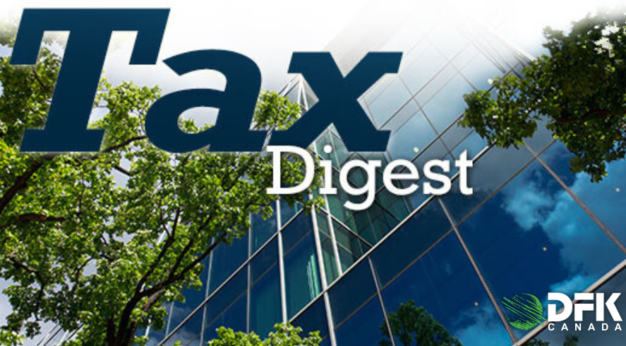DFK Tax Digest
2023 Year in Review
February 2, 2024
DFK Tax Digest – 2023 Issue Four:
- The New Trust Filing Rule Could be a Real “Bare” to Deal With: There are new reporting rules related to filing of Trust tax returns that become effective for Trusts with a December 31, 2023 year end or later. These new rules result in two significant filing changes…
- Summary of the Bill C-208 Rules coming into place for transfers effective January 1, 2024: As proposed in Budget 2023 (further revised August 4, 2023) and where conditions are met and an election is made, the business transfer between a parent and a corporation controlled by a child is excluded from the Section 84.1 deemed dividend rules. The original Bill C-208 rules introduced in 2021 have now become much more complex with rigorous requirements intended to reflect a more genuine intergenerational transfer of a business applicable to transactions dated January 1, 2024, and later…
DFK Tax Digest – 2023 Issue Three:
- Budget 2023 and changes to the Alternate Minimum Tax: The AMT is a separate tax system which is designed to ensure that wealthy individuals (including certain trusts) with high gross income that is taxed at preferential tax rates (such as dividends, and capital gains) who might otherwise use various deductions and credits to significantly reduce their tax liability still pay a minimum amount of tax…
- Tax Implications of Employer-Provided Health Insurance: Attracting and retaining employees has never been more challenging, and a good benefits plan, including health insurance coverage, is often the most important element of an employee’s compensation. It is becoming increasingly difficult to navigate the various types of insurances that employers can provide employees (including shareholder-employees) while minimizing the taxable benefit element for the insured employee and ensuring the deductibility of premiums by the business…
- Preparer Penalty Under Income Tax Act: Preparer – Penalty Subsection 163.2(4) of the Income Tax Act (ITA), the “preparer penalty,” provides for a penalty on a person who makes, or participates in, assents to, or acquiesces in the making of a statement to, by or on behalf of another person that the person knows, or would reasonably be expected to know but for circumstances amounting to culpable conduct, is a false statement that could be used by or on behalf of the other person for a purpose of the ITA. Note, a false statement includes a statement that is misleading because of an omission from the statement…
DFK Tax Digest – 2023 Issue Two:
- The New Underused Housing Tax – You Are a Canadian Citizen So How Does It Affect You? Hopefully, you have heard about the new Underused Housing Tax (“UHT”) by this point. You may be wondering what it means for you, a Canadian citizen. The basic premise is to tax non-Canadians owning residential property in Canada which is not being used in a way that benefits our society or assists in resolving our current housing crisis. Unfortunately, as with so many new legislative changes the government has written the legislation to avoid any loopholes. In so doing, they have created filing requirements in many cases where no tax will be payable. Even where there is no UHT payable, failure to file the return carries potential $5,000 (individual) or $10,000 (corporate/partnership) penalties….
- Budget Update: Bill C-208 and Intergenerational Transfers: Bill C-208 was a private members bill that was passed in June of 2021. It was introduced to allow similar tax treatment on intergenerational family transfers of Canadian Controlled Private Corporations (CCPC) as an arm’s-length sale. Before C-208, if you sold a company to an arm’s-length company, the gain was taxed as a capital gain. However, if you sold a company to a company controlled by certain relatives, the gain was recharacterized and taxed as a dividend…
- Understanding Changes to Canada Revenue Agency “CRA” Administrative Policy for Certain Taxable Benefits: In this blog we will cover the changes that the CRA recently made to its administrative policy for certain taxable benefits related to gifts, awards, and rewards, as well as virtual social events. With more employees working from home since the pandemic, the number of gifts and awards given to employees has been increasing. Thankfully, the CRA lately decided to introduce some flexibility to its administrative policy to allow employees to receive more of these benefits tax-free. Yet, employers are still required to do some work and abide by additional guidelines to keep these benefits tax-free for their employees…
DFK Tax Digest – 2023 Issue One:
- Claiming Working from Home Expenses: For your 2022 personal tax filing, the Canada Revenue Agency has two options that will allow employees to report expenses they incurred while working from home. All eligible members of a household who worked from home can each claim working from home deductions using either method…
- Health Spending Accounts: We have recently seen an increase in the number of clients inquiring about Health Spending Accounts (or “HSA”, also referred to as “Health Care Spending Accounts” or “HCSA”). Because of this, we thought it would be helpful to provide a brief summary of what HSAs are and how they are taxed…
- Tax-Free First Home Savings Account (“FHSA”): The FHSA was introduced by the Federal government in Budget 2022. The FHSA is a new registered plan that will give first-time home buyers the ability to save up to $40,000 (lifetime contribution limit) on a tax-free basis to purchase a qualifying home. The annual contribution limit will be $8,000. Contributions to the FHSA will be tax deductible. Income and capital gains earned within the FHSA will generally not be taxable. A qualifying home is a housing unit located in Canada or a share of the capital stock of a cooperative housing corporation, the holder of which is entitled to possession of a housing unit located in Canada….

